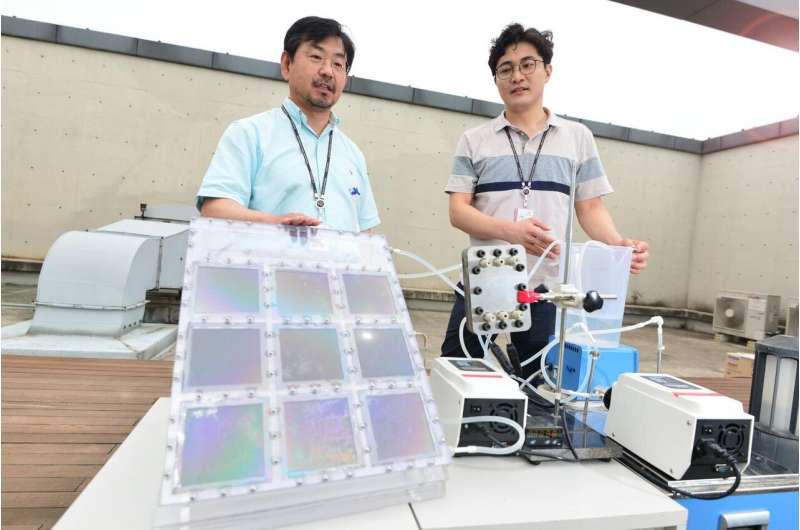Solar-driven membrane distillation technology that can double drinking water production

A joint research team from the Korea Institute of Science and Technology (KIST), led by Dr. Kyung-guen Song from the KIST Water Cycle Research Center and Dr. Won-jun Choi from the KIST Center for Opto-Electronic Materials and Devices, has used solar energy technology to develop a highly efficient membrane distillation technology that can produce drinking water from seawater or wastewater.
Membrane distillation is a desalination technology that turns seawater into potable water. In this process, water vapor is evaporated from seawater by thermal energy and passed through a hydrophobic membrane that separates the water vapor from the seawater. The water vapor then condenses to produce drinking water. Compared to existing thermal desalination methods, membrane distillation can be performed at low temperatures, which means it requires less energy, and is therefore a promising next-generation desalination technology.
Solar absorbers are used to gather solar light and heat up water. Previously commercialized solar absorbers have low solar absorption performance and can only be used in certain areas with the proper solar radiation conditions. Another weakness of existing systems is that the solar absorber must be very large in size in order to absorb the necessary amount of solar radiation.
The KIST research team used a new solar absorber made of titanium (Ti) and magnesium fluoride (MgF2) in a multi-layer film to develop a high-efficiency solar-driven membrane distillation technology that can exponentially increase water production. This film can be simply fabricated using an electro-beam evaporator.
The newly developed solar absorber absorbs over 85% of solar energy with a wavelength of 0.3-2.5 μm, which is the main spectrum of solar energy, while heating water to temperatures of more than 80 degrees C. Furthermore, when the absorber was applied to a solar-driven membrane distillation, it was possible to produce 4.78 L/m2 of potable water over a period of 10 hours on a clear day in September. This demonstrates a very high level of performance and a production volume of more than double that of previously commercialized solar absorbers.
The technology can be used to supply drinking water in isolated areas without energy infrastructure such as underdeveloped countries, island areas, and remote areas with a lack of potable water. The technology could also be used by the military to supply drinking water to soldiers stationed abroad or at army field posts.
"This study combines material technologies with water treatment technologies and is significant in that it is a successful case of integrated research that has resulted in revolutionary achievements," said Dr. Kyung-guen Song of the KIST. "We plan to continue developing water treatment technologies that apply advanced materials technologies through ongoing integrated research."
More information: Jaewon Shin et al, Enhanced performance of a direct contact membrane distillation (DCMD) system with a Ti/MgF2 solar absorber under actual weather environments, Desalination (2020). DOI: 10.1016/j.desal.2020.114580


















